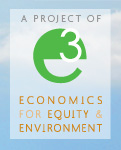This is the second post in a series on the rebound effect and energy efficiency by Real Climate Economics blogger James Barrett. It originally appeared in the Great Energy Challenge blog, in partnership with National Geographic and Planet Forward
My last post on David Owen’s piece in the New Yorker and on the Jevons effect stirred up some interesting questions and discussion that I want to follow up on here. My last one purposely avoided some of the more technical parts of the issue to keep it readable and under my word limit. I think I’m about to undo that.
But first we should pay thanks to the great 20th Century philosopher, Yogi Berra, from whom I shamelessly stole the title of this post. Though he discovered it nearly 100 years after Stanley Jevons, I believe his exploration of the Jevons effect is more complete and accurate than Jevons’ own, as well as being vastly shorter. The notion that we could get so efficient at using energy that we’d end up using more is about as valid as the idea that a restaurant could get so crowded that it was empty. (more…)

